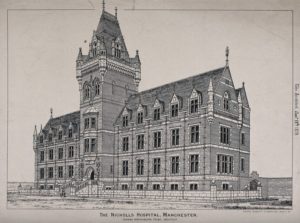Friday August 30th, 1918
Light duty again. Cleaned equipment. Nice day.
Officers of the Manchester Regiment
Today the officers of the Battalion attend riding school. Yesterday, three officers were mentioned in the Battalion’s Diary. Two of them have been awarded the Military Cross and all three have risen from the ranks.
T. 2nd Lt Stanley Eyres Gwinnell

Stanley Gwinnell joined the 15th Battalion of the Royal Scots as a Private (18633). Presumably he rose through the ranks until he became an officer cadet in spring 1917. He subsequently transferred to the Manchester Regiment when commissioned in August 1917.¹
His father, in the census of 1891, was a hairdresser. By 1901, Stanley, now 13, was a resident pupil at the Nicholls Hospital in Ardwick, Manchester. The school was ‘for the maintenance and education of the sons of honest, industrious and poor persons‘. Ten years later, Stanley was working in dentistry. His two brothers were office workers and they lived with their widowed mother and younger sister.²
Stanley will rise to the rank of Lieutenant by the time he relinquishes his commission in November 1919. He will retain the rank of Lieutenant, though does not seem to use it. He will die in 1928, aged forty, and leave his estate of £300 to his older brother Harry.
T. 2nd Lt. Cecil Hill, MC
Cecil Hill joined the 20th Manchester Regiment as a private (18143). He earned the 15 Star, serving in France from November 1915. He was commissioned in June 1917 and will rise to the rank of Lieutenant.
Yesterday’s Battalion Diary recorded Cecil as having a Military Cross. This will be mentioned in the London Gazette in mid-September 1918. ‘For conspicuous gallantry and devotion to duty during an enemy attack. In spite of a heavy bombardment, with the left flank completely in the air, he valiantly held on to his sector, continually moving along the line with great disregard for his own safety. It was largely due to his good work that the position was maintained.’³
In the census of 1911, Cecil lived with his widowed mother and two brothers. His oldest brother was an electrician and his youngest brother a butcher’s apprentice. Cecil was a clerk in a textile company.²
Captain Peter Darlington, MC
Before the war, Peter Darlington worked as a clerk in the Alkali works at which his father was a foreman. He had also served in the National Reserve, 5th Battalion of the Territorials of the Cheshire Regiment.
Peter joined the 1st City Battalion of the Manchester Regiment in August 1914, just after war was declared, and was quickly promoted to Sergeant and then became Company Quarter Master Sergeant in November. He was sent to France a year later. In March 1917 he went to the Officer Cadet Battalion in Purbright and was granted a commission with the Manchester Regiment in June 2017.² In November 1917, T. 2nd Lt Peter Darlington of the Manchester Regiment was awarded the Military Cross.º
‘For conspicuous gallantry and devotion to duty when in command of his company after all the other officers had been wounded. Although only a few men of his company were left he held to his position against enemy counter-attacks.’†
By August 1918, Peter Darlington MC is a Captain.
9th Battalion / Manchester Regiment War Diary – 30th August 1918 – Haudricourt
Training:- Musketry, Specialists, Anti Aircraft Lewis Guns, Young NCO, Riding School for Officers. Tactical Schemes will be held on Wednesdays for all Officers and on Saturdays for all NCO. 2Lt JH Hodges invalided to UK 8-8-18. 3 OR invalided to UK between 7-8-18 and 14-8-18.
References & Further Reading
¹ London Gazette, 24 August 1917, supplement 30249, page 8782
² Ancestry UK website
³ London Gazette, 13 September 1918, supplement 30901, page 10965
º 23 November 1917, London Gazette, supplement 30399, page 12318
† London Gazette, 6 April 1918, supplement 30614, page 4211
^ Nicholls Hospital, by architect Thomas Worthington, 1879, copyright The Wellcome Collection


